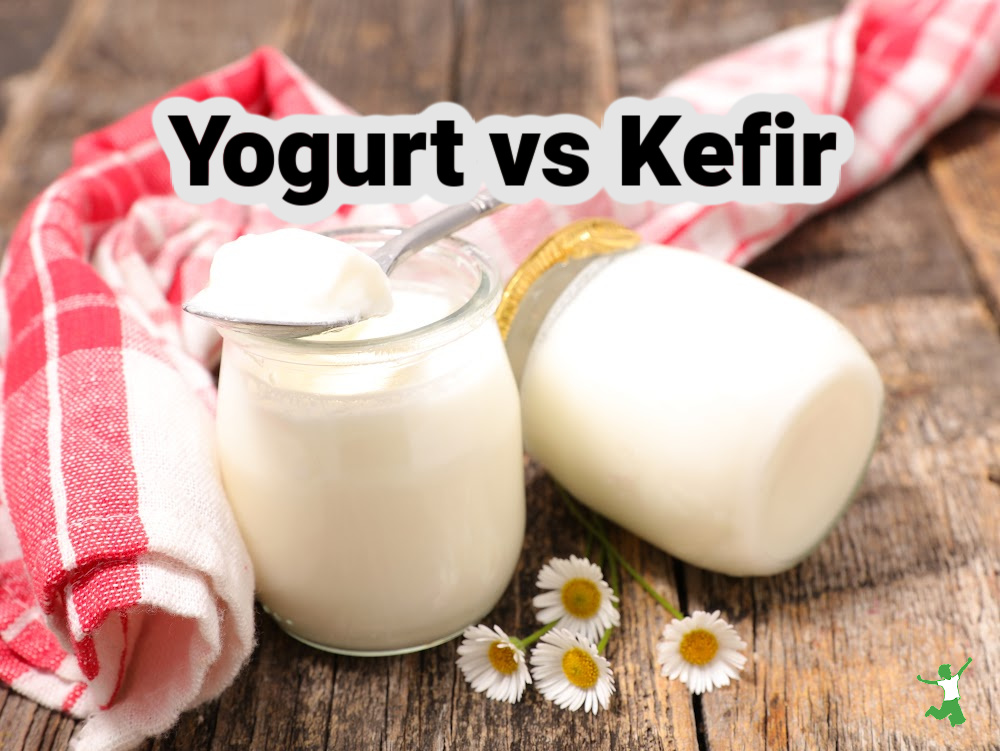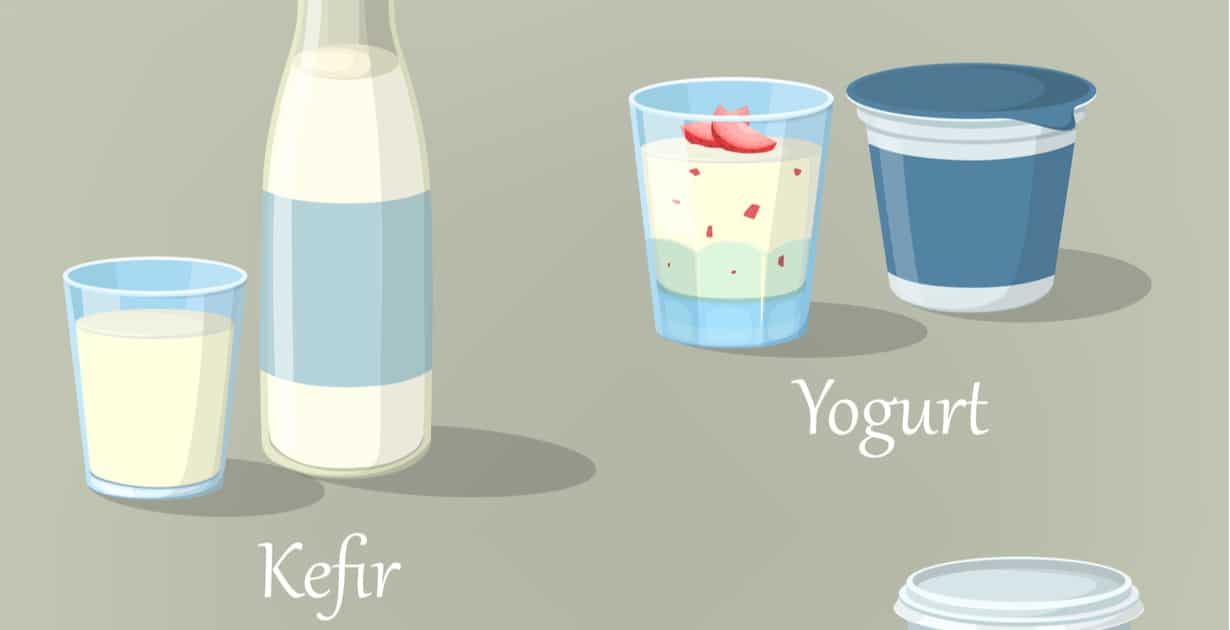Introduction to the Battle: Kefir vs Yogurt
Are you trying to decide between kefir vs yogurt?
Both of these fermented dairy products have been gaining popularity in recent years due to their health benefits.
But which one is really better for you?
In this article, we will explore the differences between kefir and yogurt and help you make an informed decision.
The Fermentation Process: How Kefir and Yogurt are Made
Kefir:
Kefir is made by adding kefir grains (a combination of yeast and bacteria) to milk.
The mixture is then left to ferment at room temperature for 12-24 hours.
During the fermentation process, the kefir grains consume the lactose in the milk and produce lactic acid, carbon dioxide, and alcohol.
This gives kefir its tangy flavor and slightly effervescent texture.
Kefir grains are a combination of yeast and bacteria that look like small, gelatinous beads.
Kefir is a good source of probiotics, which can help improve gut health.
Yogurt:
Yogurt is made by heating milk to a specific temperature and then adding live cultures of Lactobacillus bulgaricus and Streptococcus thermophilus.
The mixture is then incubated at a warm temperature for several hours until it thickens and develops its characteristic tangy flavor.
The live cultures in yogurt can help boost the immune system and improve digestion.
Greek yogurt is made by straining regular yogurt to remove the whey, resulting in a thicker, creamier texture.
Both kefir and yogurt can be made with non-dairy milks, such as coconut milk or almond milk, for those who are lactose intolerant or vegan.
Kefir vs Yogurt: The Main Differences
When it comes to fermented dairy products, kefir and yogurt are two popular options.
However, there are some key differences between the two:
Bacteria
Kefir contains a wider variety of bacteria than yogurt, including both yeasts and bacteria.
This makes kefir a more diverse source of probiotics, which can be beneficial for gut health.
Texture
Kefir has a thinner, more drinkable consistency than yogurt.
It also has a slightly effervescent texture due to the carbon dioxide produced during fermentation.
This can make it a refreshing option for those who prefer a lighter consistency.
⇒Kefir’s effervescent texture can make it a refreshing option for those who prefer a lighter consistency.
Taste
Kefir has a tangy, slightly sour taste that is similar to yogurt but with a slightly more complex flavor profile.
This can make it a great option for those who enjoy a tangy taste with a little more depth.
⇒Kefir’s slightly more complex flavor profile can make it a great option for those who enjoy a tangy taste with a little more depth.
Kefir vs Yogurt: The Health Benefits
Both kefir and yogurt are considered to be healthy foods due to their probiotic content.
Probiotics are beneficial bacteria that live in our gut and help support digestive health.
However, there are some differences in the specific health benefits of kefir and yogurt:
Kefir:
- May improve digestion and relieve constipation
- May boost immune system function
- May reduce inflammation in the body
- May improve skin health
Yogurt:
- May lower blood pressure and cholesterol levels
- May reduce the risk of type 2 diabetes
- May improve bone density and prevent osteoporosis
- May improve mental health and reduce anxiety and depression
⇒Kefir may be particularly beneficial for those with digestive issues, while yogurt may be more beneficial for those with heart health concerns.
Kefir is a fermented drink made from milk and kefir grains.
It has a tangy taste and a thinner consistency than yogurt.
Kefir may be particularly beneficial for those with digestive issues, as it contains a wider variety of probiotic strains than yogurt.
It may also help relieve constipation and improve immune system function.
Additionally, kefir has been shown to reduce inflammation in the body and improve skin health.
Yogurt is a fermented dairy product that is thicker and creamier than kefir.
It contains fewer probiotic strains than kefir, but is still a good source of beneficial bacteria.
Yogurt may be a better choice for those looking to improve their heart health or reduce their risk of type 2 diabetes.
It has been shown to lower blood pressure and cholesterol levels, improve bone density, and prevent osteoporosis.
Additionally, some studies have suggested that yogurt may improve mental health and reduce anxiety and depression.
Both kefir and yogurt can be part of a healthy diet, but it’s important to choose varieties that are low in added sugars and artificial ingredients.
Look for plain, unsweetened versions, and add your own fruit or honey for sweetness.
You can also try making your own kefir or yogurt at home for a more natural and cost-effective option.
Kefir vs Yogurt: The Nutritional Differences

When it comes to choosing between kefir and yogurt, it’s important to know the nutritional differences between the two.
While both are good sources of protein, calcium, and other nutrients, there are some variations in their nutritional profiles.
Kefir:
- Contains more probiotics than yogurt
- Contains less lactose than yogurt, making it easier to digest for people who are lactose intolerant
- Contains more B vitamins than yogurt
Yogurt:
- Contains more calcium than kefir
- Contains fewer calories and less fat than kefir
- Contains more vitamin D than kefir (if fortified)
It’s important to note that kefir and yogurt can have different strains of probiotics, which can affect their health benefits.
Additionally, some yogurts may contain added sugars, which can increase calorie and carbohydrate content.
Both kefir and yogurt can be part of a healthy diet, but it’s important to choose varieties that are low in added sugars and high in beneficial nutrients.
⇒Fun fact: In some cultures, kefir is believed to have medicinal properties and is used to treat a variety of ailments.
When choosing between kefir and yogurt, consider your personal dietary needs and preferences.
If you’re lactose intolerant, kefir may be a better option due to its lower lactose content.
If you’re looking for a calcium-rich option, yogurt may be the way to go.
Kefir vs Yogurt: The Cost Differences
The cost of kefir and yogurt can vary depending on the brand and where you live.
However, in general, kefir tends to be slightly more expensive than yogurt due to its more complex fermentation process.
Factors Affecting Cost
The cost of kefir and yogurt can be affected by various factors such as the brand, location, and packaging.
Some brands may charge more for their products due to their reputation or quality.
Additionally, the cost may vary depending on where you live and the availability of the product in your area.
Lastly, the packaging of the product can also affect the cost, with larger sizes being more cost-effective.
Health Benefits
Kefir and yogurt both offer numerous health benefits, including improved digestion and a stronger immune system.
Kefir, however, is known to contain more probiotics and beneficial bacteria than yogurt, making it a better choice for those looking to improve their gut health.
Kefir contains up to 61 strains of bacteria and yeast, while yogurt typically contains only a few.
Some people describe kefir as a cross between yogurt and buttermilk.
Kefir vs Yogurt: The Environmental Differences
Kefir
Kefir requires fewer resources to produce than yogurt since it does not need to be heated or incubated at a specific temperature.
However, the production of dairy products in general has a high environmental impact due to greenhouse gas emissions from cows and other factors.
Kefir production requires less energy than yogurt production.
The production of dairy products has a high environmental impact due to greenhouse gas emissions from cows.
Yogurt
Yogurt requires more resources to produce than kefir since it needs to be heated and incubated at a specific temperature.
However, some brands use sustainable and environmentally-friendly practices such as using organic milk and reducing waste.
Some yogurt brands use sustainable and environmentally-friendly practices.
Yogurt production requires more energy than kefir production.
Kefir vs Yogurt: Conclusion
When it comes to choosing between kefir and yogurt, it ultimately depends on your individual health goals and preferences.
Both of these dairy products are packed with probiotics and other beneficial nutrients that can improve your overall health.
Kefir
If you prefer a thinner, more drinkable consistency and want a wider variety of probiotics, kefir may be the better choice for you.
Kefir is a fermented milk drink that has a tangy taste and a slightly effervescent texture.
It contains a higher number of probiotic strains than yogurt, which can help improve your gut health and boost your immune system.
Kefir has been shown to have anti-inflammatory properties and may help reduce the risk of certain chronic diseases.
Yogurt
If you prefer a thicker, creamier texture and want to lower your cholesterol or improve bone density, yogurt may be the better choice.
Yogurt is made by fermenting milk with specific strains of bacteria, which gives it a tangy taste and a creamy texture.
It contains high levels of calcium and vitamin D, which can help improve bone health.
Regular consumption of yogurt has been linked to a reduced risk of heart disease and type 2 diabetes.
♥ Kefir Weight Loss – What You Need To Know! ⇒ READ MORE
FAQs About Kefir and Yogurt
Q: Can I make kefir or yogurt at home?
A: Yes!
Both kefir and yogurt can be made at home with a few simple ingredients and some basic equipment.
Q: Are there any side effects of consuming kefir or yogurt?
A: While kefir and yogurt are generally considered safe for most people, some individuals may experience digestive discomfort if they consume too much at once.
It is also important to choose high-quality products that are free from added sugars and other additives.
Q: Can I use kefir or yogurt in cooking?
A: Absolutely!
Kefir and yogurt can be used as substitutes for sour cream, buttermilk, or even mayonnaise in many recipes.
They can also be used to add tangy flavor to sauces, marinades, and dressings.



